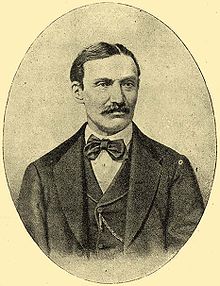- Miksa Falk
-
Miksa Falk Born October 7, 1828
Pest, Austrian EmpireDied September 10, 1908 (aged 79)
Budapest, Austria–HungaryNationality Hungarian Occupation Politician, journalist, editor Miksa Falk (or sometimes Maximilian Falk, 7 October 1828 – 10 September 1908) was a Hungarian politician, journalist, member of the Hungarian Academy of Sciences and the editor-in-chief of the German-language newspaper Pester Lloyd.
Contents
Early life
Falk was born to an impoverished Hungarian-Jewish merchant family in Pest, which was a separate town (on the east bank of the river Danube) that was later united with the towns of Buda and Óbuda (on the west bank of the river Danube) in 1873 to form Budapest, the capital of Hungary. At the age of 15, he already wrote articles for German-speaking newspapers in Pest. He studied at the Faculty of Arts in Vienna. He returned to Pest in 1848, but soon he went back to Vienna. From 1867 he lived in Hungary.
Works
Initially, he worked for the magazine Ungar ('Hungarian'), then he moved to Vienna.[1] He started to write articles at the newspaper Oesterreichische Zeitung, but when the newspaper became banned, he went to work for the newspaper Wanderer. In Hungary, he had articles in Pesti Napló, where he criticized the absolutism. At the same time, he wrote supporter conservative articles anonymously for the Budapesti Hírlap. After the Austro-Hungarian Compromise of 1867, he returned to Hungary for good and became the editor-in-chief of the German-language newspaper Pester Lloyd, and also worked for the Politikai Hetilap ('Political Weekly Newspaper').[2] He taught Hungarian language to Austrian-Hungarian Empress Elisabeth of Bavaria.[3]
Political life
Between 1850 and 1860, he joined the circle of István Széchenyi, who at that time lived in Döbling, Austria. He supported the Compromise of 1867 with his articles. From 1875, he became the representative of the Liberal Party founded by Ferenc Deák. He was representative of cities Kőszeg, Arad and Keszthely in several periods. The party collapsed in 1905 and Miksa Falk retired.
External links
- Miksa Falk in the Hungarian Biograpyical Lexicon
- Für König, Volk und/oder Vaterland? from the Pester Lloyd
- Miksa Falk: The last days and death of István Széchenyi (from MEK)
References
- ^ Die deutschsprachige Presse Ungarns in Jahren 1848/49 in Ihr Männer auf, jetzt ruft die Zeit von Mária Roszá abegrufen am 27. Jänner 2010
- ^ The Centropa Interview, CENTROPA.ORG, September 2007, accessed 27 January 2010
- ^ Gábor Ujváry: Auf den Spuren ungarischer Geschichte in Wien in Collegium Hungaricum. Accessed 27 January 2010
- This article incorporates information from this version of the equivalent article on the Hungarian Wikipedia.
Categories:- Hungarian politicians
- Hungarian journalists
- Members of the Hungarian Academy of Sciences
- People from Budapest
- People from Pest
- 1828 births
- 1908 deaths
Wikimedia Foundation. 2010.

